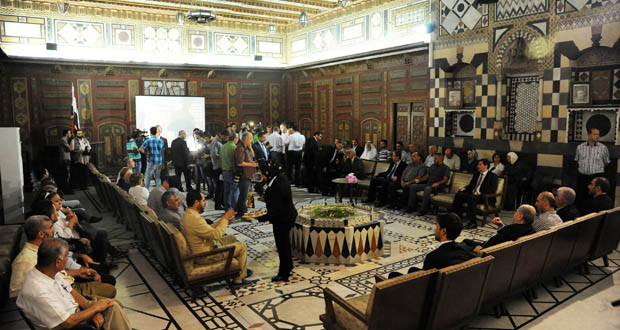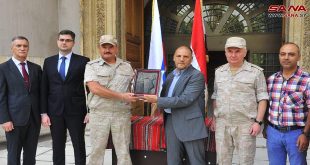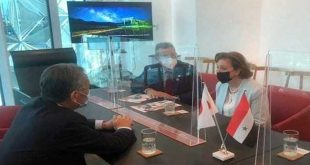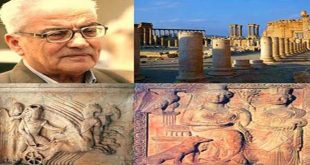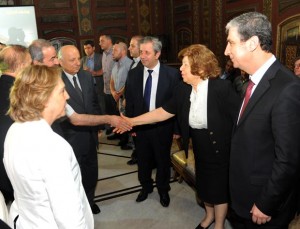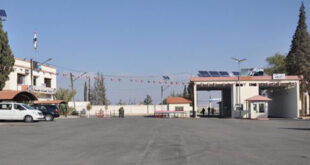Damascus, SANA – A ceremony to honor archeologist Khaled al-Asaad who was murdered by ISIS recently in Palmyra was held at Damascus National Museum, with the participation of officials and cultural figures.
Attending the event, Vice President Najah al-Attar said that this is a very sad occasion, stressing that al-Asaad was pivotal in restoring the luster of the archeological sites in Palmyra throughout the decades of his career, with him working hard and employing every resource available at his disposal to renovate the ancient monuments of Palmyra.
Al-Attar said that the international community is apparently blind and deaf to the crimes committed by terrorists in Syria, terrorists who seek to destroy civilization in the same way they did in Iraq where they destroyed magnificent and irreplaceable archeological treasures, and now they seek to do the same in Palmyra.
In turn, Culture Minister Assem Khalil delivered a speech at the event, saying that the heinous crime of murdering al-Asaad and beheading him wouldn’t have happened if terrorists hadn’t been receiving support from Arab, regional, and international sides.
For his part, head of the Directorate-General of Antiquities and Museums (DGAM) Maamoun Abdelkarim said that any talk about al-Asaad’s career and work falls short of doing him justice, as the late archeologist had spent half a century of his life working in the field of archeology, and even after retiring he worked as an expert for the DGAM for 15 years.
Abdelkarim said that al-Asaad has become a symbol or resistance by refusing to leave Palmyra and bow down to the threats of terrorists.
Omar al-Asaad, the son of the late archeologist, related the details of his abduction and murder, saying that ISIS members took Khaled al-Asaad from his home in al-Tibeh housings area northeast of Palmyra on July 23rd under the pretense of wanting to question him, and the terrorists ignored his family’s pleas to spare him due to his age and health condition.
He said that ISIS kept the old archeologist prisoner for 25 days and refused to let his family see him, and on August 18 they executed him and refused to turn over the body for burial.
The event included displaying photographs showcasing the career of al-Assad, showing him during his work on restoring archeological artifacts and monuments, including the amphitheatre and the colonnade.
Numerous officials, political figures, archeologists, historians, researchers, and religious figures attended the event.
Khaled al-Asaad was born in Palmyra in 1934. He received diplomas in history and education from Damascus University and worked as Director of Archeology in Palmyra and curator of Palmyra National Museum for over 50 years.
Hazem Sabbagh
 Syrian Arab News Agency S A N A
Syrian Arab News Agency S A N A
